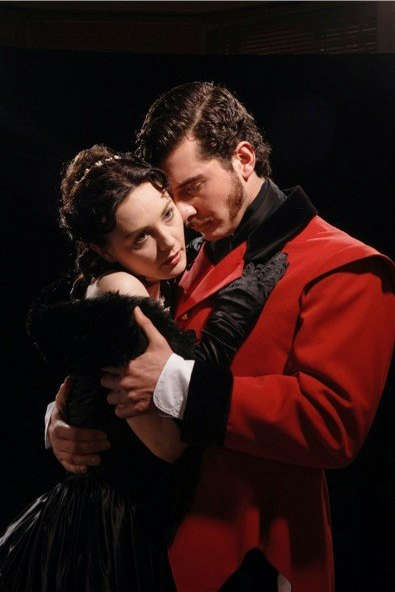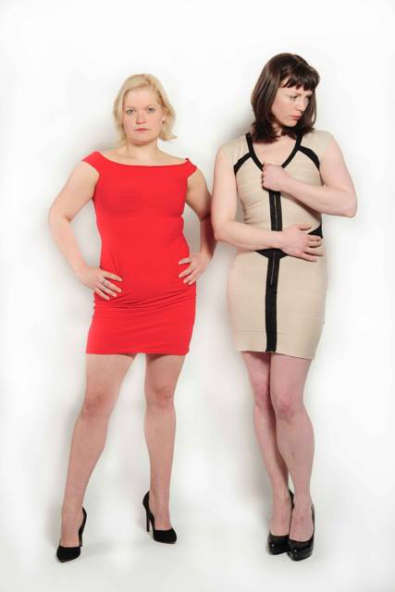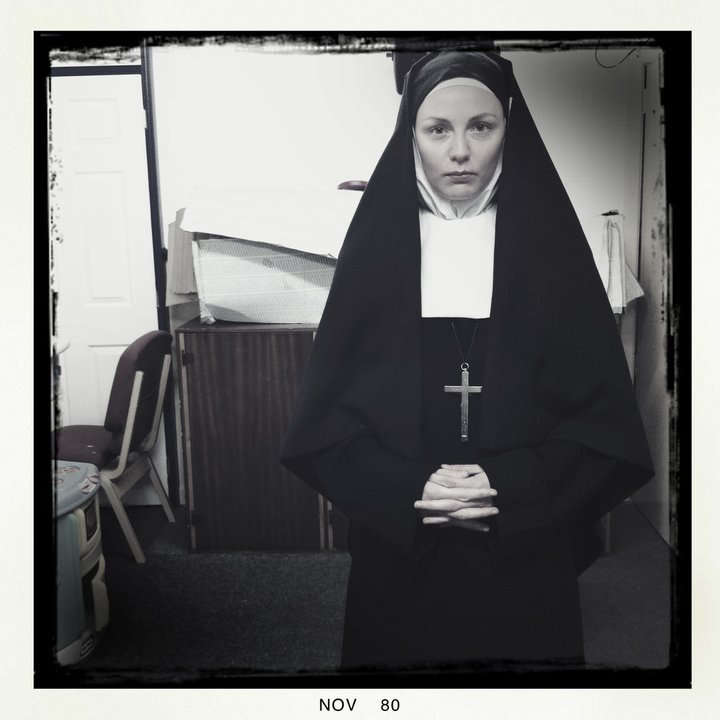Sarah O'Toole – Actor, Playwright & Director
Sarah is an Actor, Playwright and Director. She is also the Artistic Director of Anam Theatre, teaches acting and directing at NUI Galway, and runs Galway Actors Workshop.
More from...
Tell us about yourself
I'm from Galway City - I grew up in Ballinfoyle Park. I went to school in St Nicholas's Parochial School, which was lovely - multi-deomoninational, and a lot of very creative people came out of it. It was also a very middle class, privileged school. It was strange going there during the day and then going back to Ballinfoyle Park - I've always had this weird feeling of being slightly on the outside, but also always being able to move between different worlds. Sometimes that can feel like a blessing and sometimes like a curse. I was more into writing than drama when I was younger; I wanted to be a poet. I used to spend a lot of time in my room in Ballinfoyle – you always felt a risk of getting your face punched when you had a posh accent like I did. Growing up where I did, I was used to wanting to escape to other worlds, and so I was always reading. Max Hafler, who is one of my dearest and most inspiring colleagues in theatre, was my teacher then and used to say I was like a fairy, off in another world. I wasn't very well socialised.
I joined Galway Youth Theatre (GYT) when I was 15 and did my first play 'As You Like' that year. GYT was amazing back then - there were a lot more resources put into it and a lot of really good actors came out of there.
Acting must have helped with your confidence at that age...
I'm going to say something really, really controversial for someone that runs an acting school. Acting does encourage confidence and I could see it happen with my brother who had been very shy. But I was actually quite confident when I was 15, 16, 17, but when I went to drama school in the Gaiety when I was 20, while I got a good training, it was the worst thing I could have done as a person. I think it set me back, made me very unhappy with myself. It's such a weird world - it's all about external validation, and that just breaks you down. You start worrying about who you are, what you look like. I always say to people if they want to go to full time training, it's better if they're a bit older or if they're strong. But it wasn't right for me.
My experience in Irish theatre has been floating around in my head quite a lot since the recent Waking the Feminist movement on Twitter. Basically The Abbey launched their programme 'Waking the Nation' and there is one female playwright. There was uproar, not only among female theatre practitioners and a movement has started. All these horror stories about being an actress in the Irish theatre industry have started coming out. I could tell a few stories of my own, but I'd prefer not to go into it here.
So where to after drama school?
I did Pride and Prejudice with the Gate, did some devising work with Gerry Stembridge and a few other acting jobs. Then I moved to the UK, did a Masters in Directing in Middlesex University, where I studied Shakespeare and comedy and then I did a month in the Russian Academy of Theatre Arts in Moscow doing Michael Chekhov, and this is where everything started getting better. I went on to do a month in Indonesia studying Balinese theatre and from there, moved to Glasgow with my partner at the time and I started doing a lot of work there in a theatre called the Ramshorn. After that we set up our own theatre company Razed Curtain. During that time I directed the Talented Mr Ripley, played Jane Eyre, Anna Karenina, Anna in Closer, Regan in King Lear, and I played a part in Howard Barker's A Hard Heart, which great reviews in Scotland. That's when I started really, really enjoying it. It wasn't in a big fancy theatre like the Gate, but it was a much nicer experience.
I came back from Glasgow in 2008 to see my mum. I really just set up Galway Actors' Workshop to earn a bit of pocket money while I was over and then somehow, it just grew and there was no reason for me to go back to Glasgow. Then the wonderful Mary McPartlan came to one of my Michael Chekov workshops and I subsequently got offered a job teaching in NUI Galway, all thanks to Mary, and I've been there since. I've been teaching acting, playwriting and directing there for over 6 years; I'm more of a playwright and a director than an actor at the moment. Darragh O'Brien, who was one of my first ever students in NUIG, is now directing our Christmas show for Galway Actors Workshop, so it's wonderful. Because I'm going into my studies more, I'm happy to give people like Darragh and Conor Geoghegan, who teaches improv for me, more of a chance to keep it running.


What aspects of theatre and acting do you most enjoy?
I love theatre. I love theatre as a craft, I love theatre as a process. My favourite experience was working with Max Hafler on Measure for Measure a couple of years ago, using the Chekhov Technique. I love that ability to go into other worlds. A lot of my childhood was about escaping the world I was in and creating new worlds, being bigger than real life - the stakes are higher in theatre and you get to be more alive than day to day. It's very like mountaineering. I remember the first time I went over Crib Goch in Wales - there's over a 1,000 foot drop and it's quite scary, but you realise that if you don't stay entirely present right that minute, your body will die. With theatre, it's the same feeling but it's your ego, so if you don't stay entirely present, you're thinking - 'I'll make a total fool of myself or my ego will die'. Going across Crib Goch was the most amazing 20 minutes of my life, as was playing Anna Karenina and remaining on stage for the entire play. But I like being scared. Also, you're always thinking with two different brains so you're thinking about the practicality of, 'Am I standing and facing the stage?' And then you're getting imaginatively involved in the story, but you always have to keep your back of the brain out of the reality. So, for instance, I was doing a show called Low Level Panic the other year and some person had not plugged out a smoke machine that was supposed to have been taken off the stage for the second act. I had to hang a wet dress over it and I'm in the middle of this really, really emotional scene and I'm thinking, 'I can't hang that dress there, because if I hang that dress there, there will be a fire', but keeping the emotion going. And you can do that; and I love the dual brain. It's not an art form where you can get it perfect everytime. I think I can count four times perfect nights that I've had on stage.
So tell us a bit about your PhD?
I started it in December last year. I am so, so proud of and excited about the new Department for Drama Theatre and Performance in NUI. We are so well looked after in there, and the quality of the teaching staff is second to none. My thesis is about performance and the idea of haunting, using my practice to explore how we can use the female body to disrupt the culture of commemorating a history that they have been erased from, and, as the Abbey debacle has shown, are continuing to be erased from. There's this whole idea of mother Ireland that came about during the Irish literary revival where the female body was seen as a material object and it was equated with the nation, whereas the abstract principle was always seen as male - the sacrificial victim – so the material body ended up being erased from discourse. There was a great paranoia around the vulnerability of women's bodies, and so it was very heavily policed - there were lots of oppressive laws. The Magdalen Laundry is the perfect example of this. The woman was very enclosed in a domestic sphere and there's a lot coming out about that right now. It was a long time before anyone spoke about those things. Think of all the female playwrights that were rejected from The Abbey. There might be masterpieces in there but it didn't fit their idea of nation building at the time.
What's your take on how females are viewed in theatre today?
As The Abbey controversy has shown, there's huge inequality, even in Irish film and television - it's very derivative. Very American ideals get put forward - you'll notice there are no Irish female film stars apart from Saoirse Ronan, and you wonder why that is. I think it's our fault, that we don't promote our own, because there's very very talented beautiful Irish actresses like Fiona O'Shaughnessy and Jade Yourell that are just as worthy of becoming film stars. This is all being hotly debated at the moment and I would have quite extreme views on what should be done. I think they need a decisive win on the Abbey. I think it's a case of we have a history in Ireland where things get lost in tribunals and while I think playing the long game is great, the Abbey's programme for 2016 definitely has to be changed or augmented or that wonderful few weeks of action and that day of testimony in the Abbey Theatre on November 12th will just have been assimilated. Traditionally, theatre has been the microcosm for Irish politics. A lot of the 1916 Rising came out of the cultural scene, a lot of the 1916 Rising were actors and playwrights, so I do see this movement as being potentially very, very important for Irish equality issues.
Describe yourself.
I think the best thing I can say is that, when I was a kid, I used to get up really early in the morning and very actively 'explore' the house. Then I would go into my mum and say, 'Sarah doing', and toddle off. She would then get up and follow the trail of destruction my curiosity had wrought. I'm not sure my essential nature, if that's a thing you can believe in in a post-modernist world!, has changed very much since then. I'll always be very curious and a little bit bold, but honest.
What drives you?
With the PhD and performance stuff, there's so much wrong with the world and we keep our heads in the sand. I love those scenes in Shakespeare plays where a regime built on corruption is having a big celebration of itself, only for a ghost to walk in and fuck it all up for them. Banquo freaks Macbeth out by reminding him of his guilt, and the ghost of Old Hamlet stalks the battlements of Elsinore because there is something rotten in the state of Denmark, a "something to be done" to quote one of my favourite theorists, Avery Gordon. What drives me is to find humourous and ballsy ways to expose that, like thinking of creative acts that do things that are funny but provoking, because I just don't like pretending that nothing's wrong. I suppose that drives my work.
You took part in what you describe as a political action at the Galway Races - can you tell us about that?
Ladies' Day is a space that is conditioned very much by discourses of capitalism, patriarchal ideals of beauty, a very conditioned idea of femininity, which sort of distracts from the real issues facing women's bodies in Ireland today which is Repeal the 8th. It's almost like people get distracted by things like this, so we decided to go and say 'Let's talk about Ladies on Ladies Day' and went dressed as suffragettes. I'm more interested in intervening in public spaces than in theatrical spaces because in a theatre, people come because they want to see you - they don't necessarily want to see you when they're distracting themselves with what's wrong with Ireland by buying into this spectacle of commodified femininity and shall we say political corruption. Anyway, a picture of us got sent to Rabble and then it went completely viral on the internet. We didn't expect that to happen - the Journal wrote about it too. So people really enjoyed it.

What are you working on at the moment?
I've been writing more and more - I've written two plays this year. I've written four or five plays altogether and I love it.
I also have a few entertaining political actions planned with my partners in crime, so we're working on those. There's a lot of public events to intervene in the next year. I'll be working on the show for Cúirt, which I'm really excited about. I'll be working with the idea of female poets and trying to connect a lineage to now so that they're there for people to draw on.
My friend and I were talking about how next year instead of having New Year's resolutions, we'd have one word for the year and you can relate anything to that. So I'm going to use 'Inwards'. I really want to think deeply about my work and connect it to what I am studying. I'm going to shut down my engagement with social media more and I really need to start writing my thesis.
What's your view of the theatre industry in Galway?
I think we could do a lot better with theatre. I think there are great people that aren't being supported. I think there's a huge clique floating around at the top getting all the resources and then there are loads of younger artists that are just not given any resources. Galway has a huge problem with the Galway theatre scene. There's really great young people coming out of college and they all have to move to Dublin to get a career and yet Galway is called one of the most creative cities in Europe, but then all our arts funding goes to the International Arts Festival and Druid, and Druid don't cast from Galway - they rehearse in Dublin. So all these people in Galway who are being so creative and work so hard are doing this with their own money or on minimal wages, and we pay to bring in other artists and pay them professional wages. I think it's a huge disservice to this community. I think we could afford to take some money off the bigger organisations. Moonfish are an example of a really exciting company but there's more than that. Mephisto were a great company - they worked so hard for so long, but never got the support they deserved. And even with Anam, I don't have the energy to run my theatre company because I've no resources. I really think it's amazing that this city has a reputation for creativity because it's all their hard work for very little pay.
What is it about Galway that keeps you here?
I love Galway, I love the community. Theatre people in Galway are the most generous people I've ever met and they deserve so much - they're such an amazing community, and they'll always go out of their way to help you. And I love living near Connemara. Being able to hike whenever I want in those beautiful mountains is really important to me. And I love the wildness of our river.
What would you like to see happening?
I'd like to see more money, more initiatives, more funding for Galway theatre companies and for Galway art galleries, so that people can do fully paid shows. The money's out there, it's just been given to the wrong people.
- Ulla Hokkanen - Previous
- Next - Dorothy Creaven